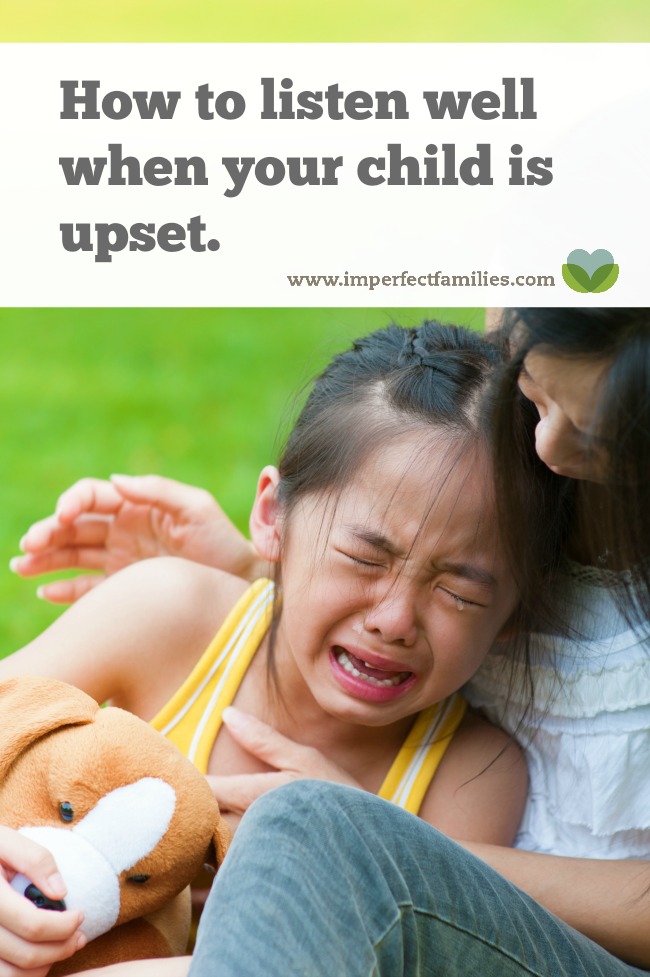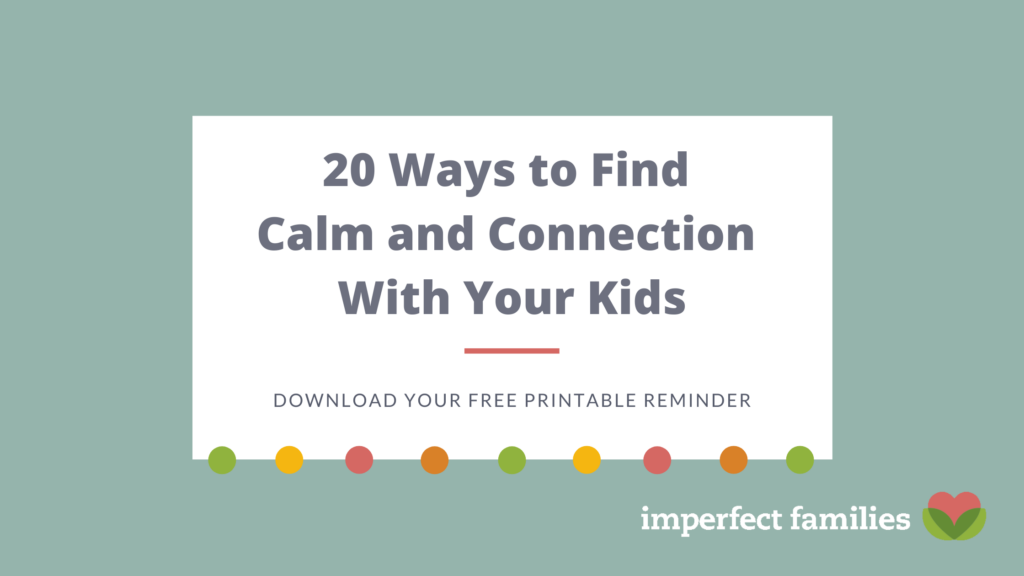Saying “calm down” when your child is crying or angry never works. Thankfully, there are ways you can support your upset child even when they are experiencing big feelings. Print these listening tips so you can reference them in the heat of the moment!

The volcano has exploded. The floodgates are wide open. Your child is experiencing – and expressing – some BIG emotions.
Your first instinct is to try to silence it: “Settle down. Calm down. You’re fine.”
When that backfires, your own brain shifts into panic mode. Adrenaline pumps through your veins preparing your body to fight this (assumed) threat, or get away from it as quickly as possible.
Maybe it goes without saying, but parenting in panic mode does not usually go well.
The good news: There are alternatives.
The bad news: The only person we can control is us.
This means the focus of our energy and effort has to be on our own reactions – rather than trying to get our child to calm down. It means doing what we need to avoid the fight or flight response. Or, getting back to calm one we realize we’ve shifted into panic mode.
It’s not an easy position to play. It may take time and practice before it becomes your go-to reaction. That is OK. The more often you put these tips to use, the more automatic this response will be.
How to Listen and Stay Present with Your Upset Child
Talk less: This might be obvious, but in order to really hear your child, you need to give them time and space to speak without interruption. That means closing your mouth and opening your ears. Even if it’s hard or you want to “set the record straight.”
No multitasking: Go beyond the normal distractions, like setting aside your phone or turning off the TV, and be aware of hidden things like thinking about what to serve for dinner, wondering how long this conversation will take, or planning a witty comeback.
Ask clarifying questions: If something is confusing or unclear, your child to “tell you more” or “then what happened?” Be curious and keep an open mind, rather than turning your questions into an interrogation.
Look for the good: Rather than being hyperfocused on the negative or the “flaws,” work to find something positive, true, or helpful in what your child is saying. Finding something good builds empathy, and will help you stay present as they talk.
Do not repeat: Often, instead of listening we try to teach a lesson or make a point. When our kids don’t listen, we repeat or rephrase what we’re trying to say a different way. Set your agenda aside for now. There will be time for teaching later. For now, just listen.
Allow all emotions: It’s difficult to let your child be upset, sad or worried. Resist the urge to tell them to “calm down” or “stop crying” before you will listen. Instead, just be present. Work to be the “calm in their chaos” rather than trying to stop the chaos altogether.
Watch for defensiveness: Defensiveness is the enemy of listening. In this state, you will focus in on everything that is “wrong” or “inaccurate” in what your child is saying, rather than staying open and curious.
Cool down: Learn to identify the cues that you’re feeling defensive. This might be physical, like making the hands into fists, or mental – starting to blame or threaten your child. Remind yourself to breathe so you can focus again.
Set a time later if you cannot listen well right now: If breathing doesn’t help you cool down, delay the conversation until you are calm again. Say something like, “I really want to listen to you, but I’m feeling upset. If I can take a 10-minute break, I’ll be able to focus better.”
It’s not easy to listen well when our kids are upset. It’s uncomfortable. We want to fix it, to ease their pain or at least stop the screaming. But, if we can stick with them in these moments of high intensity, we teach valuable communication skills. We demonstrate empathy. And we model compassion and strengthen the connection.
R elated: What to do when your child won’t calm down
Our kids feel safe to open the floodgates of emotion, knowing their parents can handle whatever feeling they need to express.
Feeling unsure?
The thought of letting a child tantrum or express big feelings can be terrifying for some parents. If this is you, you’re not alone! I’d love to talk with you about your fears and clarify the questions you have about listening well when your child is upset. Learn more about Parent Coaching and sign up for an appointment today!

Print These Tips!
Get your free printable reminder of these suggestions and sign up to have simple, encouraging parenting tips sent to your inbox from Nicole Schwarz, LMFT & Parent Coach.
By signing up to receive this freebie, you agree to my Disclosure and Privacy Policy.



Comments have been turned off to retain the privacy of all families. If you have a question or comment on the topic, you're always welcome to contact me.